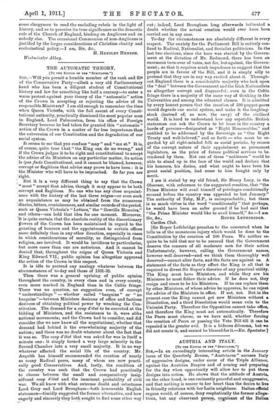AUSTRIA AND ITALY.
[To THE EDITOR or TEE "SraccuTorg."] SIR,—In an exceedingly interesting article in the January issue of the Quarterly Review, " Austriacus " accuses Italy of aggressive designs, under cover of the Triple Alliance, against the Austrian Empire and of arming and preparing for the day when opportunity will allow her to put these designs into action. He shows that the attitude of Austria, on the other band, is one eminently peaceful and unaggressive, and that nothing is nearer to her heart than the desire to live in friendly relations with her Latin neighbour. Italian official organs would, of course, deny emphatically the former allega- tions, but any observant person, cognisant of the Italian character and ideals, cannot but concur on broad lines with " Austriacus's " opinions. I should like to communicate, how- ever, to the English press a few words from Italy's point of view, not so much to confute his facts but to refute his implication that Italy, in consequence of the facts, is the immoral party. Since the great speech of Sir Edward Grey on March 13th in the House of Commons, a great deal has been written and spoken about disarmament and the prospects of a permanent European peace. Italy has welcomed the idea with the utmost sympathy and enthusiasm. She recognises one fact, however, which does not seem to have been recognised abroad : Europe will never be able to lay down her arms until justice has been done to the claims of nationality ; Europe will never be able to lay down her arms until the motives of wars of principle are removed. Italy knows what this means from her own past history ; she knows what this means when she hears the cry of Italians beyond her frontiers, such as those of Istria and the Trentino—Italian not only in language and in geographical position, but in sentiment and in unyielding aspiration. She knows what this means when Albanian fugitives tell tales of pregnant Albanian women and Turkish bayonets unsolicitous for the propagation of a race so strong in the desire for independence. She knows what this means when she reads the evidence of a nation's vitality in the literature of a people without a country—the Southern Slays. And she knows that she herself is the one interested party, like Piemonte in her own case seventy years ago, who has a war chest and the strength to render possible, when the opportunity comes, the fulfilment of the hopes of nationalism. The Mazzinian and Garibaldian legends are not dead. They live bright in the heart of every Italian ; and Italy will not shrink from what she considers her duty, though for some years it may augment the burden of taxation upon her people. Everyone must admit that Austria is the great obstacle to the hopes of nationalism in Europe. She is therefore the great obstacle to a permanent European peace, for nothing, neither good government nor fierce oppression, can curb the growing nationalist spirit. The time is not far off when these facts will have to be faced, and the dictum "If there were no Austrian Empire it would be necessary to create it " will then have to be put to the test. Italy has made up her mind which way to act. So have the Slavonic peoples. But Italy would be sorry if her friends the English public—the "children of freedom " as she has called them—took a wrong and un- sympathetic view of her warlike preparations from the article of " Austriacus " in the Quarterly Review. For it is principle and sympathy and love of humanity, not selfish aggression,
which moves her policy.—I am, Sir, &c., B. Florence.











































 Previous page
Previous page